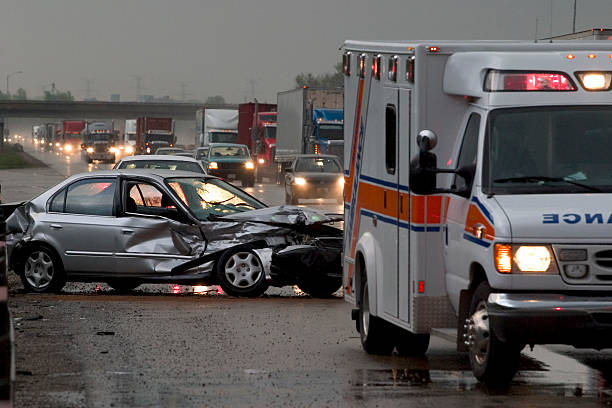
By Karen Piso Nadeau, Esquire
Many people in Massachusetts assume that if they are injured in an accident, they can recover against the individual or business (note: usually recovery is from their insurance companies) involved in the accident simply because they were hurt. This is not the case. Just because you were hurt in a Massachusetts car accident; or suffered a broken bone when you tripped and fell in a parking lot; or got hurt while shopping inside some store; or suffered a head injury on a construction site does not guarantee that you can recover money from the insurance company that insures the driver of the car that collided with you or the owner of the business where you fell or the construction company in charge of the job site. Massachusetts law requires a person seeking to recover compensation for the harm they suffered to identify the party (or parties) that caused them harm and show that the party was negligent or in other words, responsible for the harm caused due to some wrongdoing. In legal circles, we say that the plaintiff (injured party seeking money) has the burden of proof.
Massachusetts Negligence Law
As an injured victim, the law requires you to prove negligence against the party from whom you are seeking compensation by showing: 1.) the party had a duty; 2.) the party breached this duty or failed to fulfill the responsibility they had; 3.) the party’s wrongdoing was the proximate cause of the damages you suffered, meaning the party’s failure to fulfill its duty is the cause of your harm; and 4.) you suffered damages or harm. In simplest terms, negligence must be proven by the injured party to recover money whether it be a car accident, slip and fall, or construction site accident. Negligence can be described as an act or a failure to act without care or without safety to others. It is often described as a reasonableness standard. What would a reasonably prudent person do in similar circumstances? There a few narrow exceptions to this negligence standard in accident cases. For example, there is a strict liability standard for the owner of a dog in Massachusetts. This means if a dog attacks and bites an individual causing them harm, the owner of the dog is strictly liable, meaning the owner is deemed legally responsible without the showing of negligence or fault. However, this is the exception, and most accident cases in Massachusetts follow the negligence standard.
Car Accident Example
One example of establishing negligence in Massachusetts that is easy to understand is a car accident where you are stopped for a red traffic light and a truck rear ends your vehicle causing you to injure your shoulder and suffer a shoulder tear requiring surgery. You incur medical bills and you are out of work for several months due to the injuries. The injured party meets her burden of proof by showing: 1.) the truck driver had a duty to operate the truck in a safe manner while traveling on the road; 2.) the truck driver breached this duty by failing to keep a safe distance behind another vehicle and failing to bring the truck to a safe stop; 3.) the truck driver’s careless driving is a direct and proximate cause of the harm suffered; 4.) the driver that was rear-ended suffered damages consisting of injury to her shoulder requiring surgery and lost income from being unable to work.
The Blame Game
While we are building a victim’s case and putting together the pieces to prove a strong case, the insurance company is very busy looking for ways to avoid paying or reducing the amount they pay. In almost every case, it is not the responsible person or at fault business paying our injured client. It is the insurance company who insures the at fault party that compensates our clients. One of the primary ways the insurance companies try to minimize the compensation to an injured party is to blame the victim for the accident.
Massachusetts Comparative Negligence Statute
Massachusetts has a Comparative Negligence Statute that sets forth the law relating to attributing fault to the victim injured in an accident. If a victim is found to be 51% or more at fault, they legally cannot recover. If a victim is less than 51% at fault, a victim is entitled to recovery. However, the damages are reduced by the percentage the injured party is found to be negligent or responsible for the accident. Massachusetts General Laws Chapter 231, Section 85 states the Comparative Negligence Law and the Limited Effect of Contribution Negligence as a Defense. According to M.G.L. C. 231, Section 85:
Contributory negligence shall not bar recovery in any action by any person or legal representative to recover damages for negligence resulting in death or in injury to person or property, if such negligence was not greater than the total amount of negligence attributable to the person or persons against whom recovery is sought, but any damages allowed shall be diminished in proportion to the amount of negligence attributable to the person for whose injury, damage or death recovery is made. In determining by what amount the plaintiff’s damages shall be diminished in such a case; the negligence of each plaintiff shall be compared to the total negligence of all persons against whom recovery is sought. The combined total of the plaintiff’s negligence taken together with all of the negligence of all defendants shall equal one hundred percent.
The Massachusetts contributory negligence law also provides that the party seeking to reduce the compensation to the plaintiff injured party has the burden of proof to prove the victim’s negligence. Specifically, the law states:
The burden of alleging and proving negligence which serves to diminish a plaintiff’s damages or bar recovery under this section shall be upon the person who seeks to establish such negligence, and the plaintiff shall be presumed to have been in the exercise of due care. See M.G.L. C. 231, Section 85.
Comparative Negligence Example
The way this comparative negligence plays out in a real accident case where the insurance company is seeking to blame the injured victim seeking compensation is as follows:
Driver X is involved in an intersection accident and blames Driver Y for running a stop sign. Driver Y claims he did stop at the stop sign and Driver X was speeding and came out of nowhere. Driver X suffers injuries and requires medical treatment. Driver Y’s insurance company agrees Driver X’s case is worth $100,000.00. However, the insurance company assigns 30% blame to the injured victim, Driver X, for speeding. This means if the victim’s case is worth $100,000.00, it is reduced by 30% or $30,000.00 so the insurance company only offers the injured party $70,000.00. If the injured party seeking compensation is more than 50% at fault, then the insurer will argue the victim gets nothing as his negligence is greater than the negligence of the person from whom compensation is sought.
The Search for a Way to Blame the Victim
Whether our clients are injured in Massachusetts as a pedestrian crossing a street, as a driver traveling on a highway, as a bicyclist riding his bike to work, as an individual on a construction site, as a motorcyclist traveling down main street, as a customer tripping and falling in a store or parking lot or as a tenant injured slipping and falling down his front stairs, the insurance company’s primary focus following the accident is to search for a way to blame the injured party for his or her own injuries. By saying the victim injured is partially at fault for the accident, the insurance company has a powerful weapon to minimize the value of a victim’s case and pay the victim less than the cased is worth. This results in the insurance company saving money on the insurance policy. Sometimes the insurance company has good reason to claim comparative negligence. Other times, the insurance company has no good faith basis to claim the injured party is at fault, and if they do, a good and experienced personal injury attorney will know how to aggressively fight back to get the injured client the compensation he or she deserves.
Examples of the Blame Game
An example of a potentially justifiable reason to say the victim is partially at fault is the scenario where a pedestrian is crossing the street against a stop signal for walkers and not using a nearby crosswalk. The vehicle that collides with the pedestrian has a green light and the driver says the pedestrian came out of nowhere in between cars into the street. Here, an insurance company may assign the pedestrian with partial fault for the accident. The total value of the victim’s claim is then reduced by the percentage the injured party is at fault.
We have handled cases where the insurance company claimed our clients were to blame in an attempt to avoid paying our clients the amount they truly deserve. In one case, they claimed our client was walking her dog in the middle of the street. In another case, the insurance company claimed our client was wearing dark clothes. Another case, the insurance company claimed our client was wearing improper footwear when she tripped and fell. The clients and cases where the insurance companies attempted to play “the blame game” goes on and on. In each of these cases, we look at the merits of the arguments and advise our clients accordingly. In some instances, the insurance companies have flimsy arguments and are just trying to save money on the insurance policy. The client allegedly walking the dog in the middle of the street ultimately received her full compensation after aggressively pushing back with the insurance company and showing their attempts to blame our client had no factual basis and were nothing more than bad faith tactics to avoid paying a legitimate claim.
Our experience at Nadeau Harkavy, LLC
When someone is injured in an accident, they are not thinking about who is at fault or being blamed for their own injuries. They are hurt, often traumatized, in shock, in pain and in need of medical care. Yet, the insurance company’s only focus is shifting blame and paying them as little as they possibly can from day one. The injured party and their family should be able to focus on their injuries, the necessary medical treatment and recovery. The rest should be left to an experienced personal injury lawyer to make sure the victim’s rights are protected and the injured client receives the money they deserve to get on with their lives after suffering injuries in an accident.
At Nadeau Harkavy LLC, we are located in Cambridge, Massachusetts and have over 25 years’ experience dealing with the insurance company’s blame game and the comparative negligence laws that give the insurance company some method of assigning blame to the victim injured. In fact, we have many years of prior experience handling cases for insurance companies trying to shift blame to the injured party seeking compensation. We understand how the insurance company works and what legally is and is NOT allowed. We use all of our experience to provide our clients with individual attention and guidance so they may successfully recover what they need and deserve.
When someone is injured in a Massachusetts motor vehicle accident, trip and fall, or through any other accident, a thorough investigation of the accident events is necessary to determine the cause of the accident and secure important information. As a victim of an accident, you need to make sure everything is done to protect your interests. The lawyers at Nadeau Harkavy LLC help victims and their families recover compensation in serious injury and wrongful death cases arising from car crashes and other accidents. If you have any questions about your legal rights relating to a car accident, wrongful death, trip and fall or other accident, feel free to contact us for a free consult today at 617-674-7640.
Meet The Lawyers
With 60 years of combined experience serving injured victims in Massachusetts, our team has collaborated for nearly two decades, delivering a proven track record of outstanding results for clients. Guided by a philosophy of treating clients as we would our own family, we strive to ease our clients' journey from the initial phone call to case resolution. Committed to competing and fighting vigorously, we aim to hold insurance companies accountable to the fullest extent of the law. Our belief in close communication ensures the best possible outcomes, and our approachability makes us readily available to you. Entrust us with your case, allowing you to focus on your physical, emotional, and financial recovery.
Massachusetts Personal Injury Lawyers
Massachusetts Personal Injury Lawyers with over 60 Years Combined Experience Representing Those Injured in Accidents.












